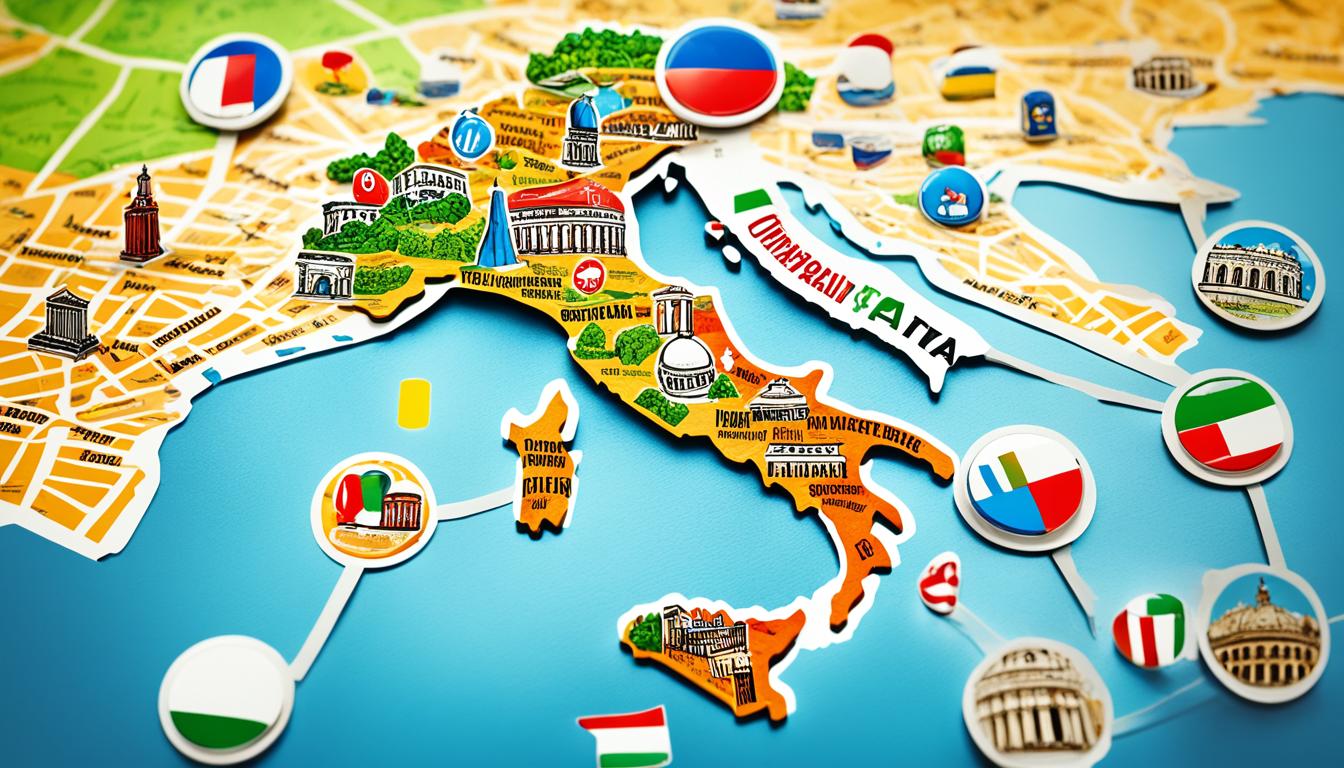Many UK businesses are looking to grow by entering new markets. Italy is a great choice, thanks to its key EU location, strong consumer market, and rich culture. This guide will help you expand into Italy, covering market analysis, legal advice, and more.
Key Takeaways
- Italy offers big chances for growing your business in Europe.
- Its large consumer base is perfect for many industries.
- Knowing the culture helps make entering the market easier.
- Following the law is vital for success in Italy.
- Its location makes reaching other EU markets easier.
- Understanding the market is key to finding good opportunities.
Understanding the Italian Market Landscape
The Italian market is rich in culture, strategically placed, and has complex rules. It has about 60 million people, with many living in cities like Rome, Milan, and Naples. This knowledge is key for UK businesses looking to enter this market.
Italy’s economy has seen ups and downs in recent years. The Bank of Italy predicts a modest growth for 2023, mainly due to spending and exports. The service sector is big, making up over 70% of the economy, with tourism, finance, and retail leading the way.
Consumers in Italy often choose quality over quantity. They like branded goods and products from their area. Businesses should think about building real connections with customers and partnering with local businesses.
| Economic Indicator | Value |
|---|---|
| GDP Growth Rate (2023) | 1.4% |
| Unemployment Rate | 8.1% |
| Inflation Rate | 5.2% |
| Service Sector Contribution to GDP | 72% |
This summary gives a basic look at the Italian market. By grasping the economy and what consumers want, UK businesses can plan better. Knowing about the people and the economy is crucial for entering the market successfully.
Exploring Business Opportunities in Italy
Italy is a great place for entrepreneurs wanting to grow in Europe. It’s famous for its culture and strong industries. These include fashion, automotive, technology, and renewable energy. Each area has its own benefits for investors.
The fashion industry is key to Italy’s economy. Brands like Gucci, Prada, and Dolce & Gabbana lead the fashion world. Deloitte reports say the global fashion market is growing. This makes fashion a top choice for investment in Italy.
The automotive sector is also a big opportunity. With brands like Fiat, Ferrari, and Lamborghini, Italy is a leader in car innovation. Experts believe the demand for electric and hybrid cars will keep growing.
Technology, especially in digital services and software, is another area to watch. Cities like Milan and Rome are seeing a rise in start-ups. These cities have skilled people and government support for innovation.
Renewable energy is also a promising sector. Italy is a leader in solar energy and sustainability. Investing in green tech in Italy could be very rewarding as the world moves towards cleaner energy.
Looking into these sectors gives UK businesses a chance to see the potential of the Italian market. With careful planning, investors can make a mark in this exciting market.
Legal Considerations for Expanding to Italy
For businesses looking to grow in Italy, knowing the legal rules is key. These rules cover how foreign companies can work in Italy. They include company registration in Italy, following local laws, and respecting labour laws.
Starting a business in Italy means choosing the right type, like a limited liability company (SRL) or joint stock company (SpA). Each type has its own legal and tax rules. Understanding these helps make better business choices and follow legal requirements in Italy.
Foreign businesses should work with the Italian Chamber of Commerce for help. They offer advice on registering, tax laws, and how to hire staff. Following these laws is a must for legal reasons and to be seen as trustworthy in the Italian market.
| Business Entity Type | Liability | Minimum Share Capital | Key Legal Requirements |
|---|---|---|---|
| Limited Liability Company (SRL) | Limited to capital | €1 | Articles of Association, Company Registration |
| Joint Stock Company (SpA) | Limited to capital | €50,000 | Audited Financials, Shareholder Agreements |
| Sole Proprietorship | Unlimited liability | N/A | Business Registration, Tax Identification |
Cultural Factors Influencing Business in Italy

Understanding Italian culture is key to doing business well. In Italy, building strong personal relationships is crucial. It affects how people negotiate and make decisions. Trust is built before talking about business.
Communication in Italy is subtle. People use non-verbal signals a lot. Knowing cultural awareness Italy helps understand these signals. For example, eye contact shows confidence and respect. A firm handshake is also a common greeting.
When negotiating, Italians like to talk a lot and share personal stories. This helps build deeper connections and shows respect for the person you’re dealing with. It’s good to chat a bit before getting into business talks.
Hofstede’s cultural dimensions offer more insights into Italian business. Italy is seen as individualistic, valuing personal success. Talking about your personal achievements can be an advantage in discussions.
To wrap up, here’s a quick look at how culture affects business in Italy:
| Cultural Aspect | Characteristics |
|---|---|
| Relationship Building | Trust is vital; personal connections enhance business dealings. |
| Communication Style | Indirect; relies on non-verbal cues and subtlety. |
| Negotiation Approach | Thorough and personal; often includes small talk. |
| Individualism | High value placed on personal achievements. |
Expand Your Business to Italy: Steps to Success
Expanding into Italy requires thorough market research and competitor analysis. These steps help businesses craft success strategies suited to Italy. Knowing what consumers want, market trends, and who you’re up against is key.
Market Research and Analysis
Market research in Italy uses both primary and secondary methods. Primary research includes surveys and interviews to get direct feedback from customers. Secondary research looks at reports and data related to your industry.
Online tools make research easier. They help understand what customers like and how the market moves. This knowledge is crucial for making smart decisions when entering the Italian market.
Identifying Key Competitors
Knowing who your competitors are in Italy is vital. You need to look at their strengths, weaknesses, and where they stand in the market. A table can show how you stack up against them.
| Competitor | Market Share (%) | Strengths | Weaknesses |
|---|---|---|---|
| Competitor A | 20 | Established brand, strong customer loyalty | Higher prices than market average |
| Competitor B | 15 | Diverse product range, effective marketing | Limited distribution channels |
| Competitor C | 30 | Competitive pricing, extensive online presence | Less focus on customer service |
Learning from competitors helps businesses find their place in the market. Understanding the market and competition is crucial for growth and success in Italy.
Creating a Business Plan for the Italian Market
Expanding into Italy requires a strong business plan. It must include strategies tailored to Italy’s unique market. Also, having clear financial goals through detailed financial planning is key to success.
Market Entry Strategies
Finding the right way to enter the Italian market is crucial. You can choose from several options:
- Direct Investment: This means fully owning a subsidiary, giving you full control.
- Joint Ventures: Working with local companies can reduce risks and help with cultural fit.
- Franchising: This method uses local knowledge while keeping your brand standards high.
Setting Financial Projections
Realistic financial goals are vital for your Italian business plan. Think about these points:
| Projection Type | Details |
|---|---|
| Cost Estimates | Include expected costs for setting up, running, and marketing your business. |
| Revenue Estimates | Make forecasts based on market studies and past success in similar markets. |
| Breakeven Analysis | Find out how much you need to earn to cover costs and when you’ll start making profits. |
UK businesses that have made it in Italy show how crucial good planning is for growth.
Navigating Legal Regulations and Compliance
Expanding a business into Italy means understanding the local laws well. These laws cover many areas for foreign businesses. It’s key to follow these rules to avoid big problems. Companies need to know the laws that affect their work.
The main legal areas to watch out for are:
- Taxation: Italy’s taxes can be tricky, with different rates for different businesses. Knowing what taxes apply is crucial for planning your budget.
- Labour Laws: Rules about jobs cover employee rights, what’s in contracts, and how to end them. Getting advice on these can help avoid legal issues with staff.
- Environmental Regulations: Italy has strict rules to protect the environment. Companies must make sure they follow these laws.
Getting legal advice in Italy can help avoid big mistakes. Working with local experts can give you the right guidance. They can help make a plan to follow the laws that fits your business.
Choosing the Right Location for Your Business in Italy

Finding the right spot for your business in Italy is key to success. Some cities and areas offer big benefits that can boost your business. Things like good infrastructure, easy access to markets, and the local economy are crucial.
Knowing which cities in Italy are best for business helps make smart choices.
Evaluating Major Cities and Regions
Milan, Rome, and Turin are top choices for business in Italy. Milan is a financial hub with a lively startup scene and lots of innovation. Rome has a huge market and great tourism chances thanks to its history.
Turin is known for its manufacturing and is close to Europe’s big markets.
Understanding Local Economic Conditions
The economic conditions in Italy vary by region, affecting businesses. Northern areas often have strong economies, while the south has higher unemployment but special business perks. A good location strategy in Italy considers these differences to help make better decisions.
Building a Local Network and Partnerships
Networking in Italy is key for businesses wanting to make a mark. It’s all about building strong partnerships, which means getting to know the local culture. This culture values personal connections and trust. Being active in networking can really open doors for working together and doing well.
Trade fairs and industry events are great places to meet potential partners. But don’t stop there. Joining business chambers and associations in your field can also help. These groups often make introductions and share tips on doing business in Italy.
Showing you’re all about working together is a smart move. Respect Italian values and business manners to gain trust from local partners. Social events like dinners can be perfect for building these relationships in a casual way.
| Networking Avenue | Description | Benefits |
|---|---|---|
| Trade Fairs | Events showcasing various sectors and businesses. | Direct access to industry stakeholders, market insights. |
| Industry Associations | Organisations representing specific sectors. | Networking opportunities and best practices sharing. |
| Business Chambers | Local organisations promoting trade and economic interests. | Facilitated introductions and support for newcomers. |
| Social Events | Informal gatherings fostered by local groups. | Relationship building in a relaxed atmosphere. |
Using these methods can really help you make strong business partnerships in Italy. It’s not just about you; it’s about working together. Building a local network is all about embracing the teamwork spirit that’s big in Italian business.
Marketing Strategies for the Italian Audience
To connect with the Italian audience, it’s key to use marketing strategies that fit the local culture and habits. The Italian market is unique, so brands must adjust their brand messages and digital marketing. This part looks at how to adapt brand messages and use digital marketing well.
Adapting Brand Messaging
Brands entering Italy need to understand what matters to consumers. They should focus on being real, offering high-quality products, and valuing tradition. This connects well with Italian consumers. To stand out, companies can:
- Do deep market research to grasp what locals like.
- Use local words and sayings to make their message hit home.
- Highlight eco-friendly and ethical aspects, as these are now more important.
Utilising Digital Marketing in Italy
Digital marketing in Italy uses many ways to reach people. Social media like Instagram, Facebook, and TikTok are key for building a brand’s image. SEO strategies also help increase visibility. Key steps include:
- Creating content that speaks to what Italians enjoy.
- Running targeted ads to reach certain groups of people.
- Keeping an eye on how people interact online to improve marketing.
Understanding Tax Implications for Foreign Businesses
The tax system in Italy is complex for foreign businesses. They must understand the Italian tax system to follow the rules and make the most of their money.
Corporate tax rates are key to consider. The standard rate is 24%. But, some regions have their own rates, which can change the total tax for foreign companies.
Value Added Tax (VAT) is also important for businesses. The standard VAT rate is 22%. Some goods and services have lower rates. It’s wise for those new to the Italian tax system to get advice from tax experts. This advice helps avoid fines and ensures correct reporting.
Italy has tax incentives to attract foreign investment. Some sectors get special tax breaks to boost growth in new industries. These breaks can help foreign businesses lower their taxes.
Knowing the rules for tax compliance is vital. The Italian Revenue Agency has strict rules for tax declarations. It’s important to have local knowledge and stay updated on tax changes. This can greatly affect a business’s success in Italy.
In summary, doing thorough research and working with tax experts who know the Italian system is key for foreign businesses in Italy. Understanding these tax matters helps with smoother operations and success in the Italian market.
Recruiting and Managing Local Talent

When hiring in Italy, it’s key to understand the local culture and laws. These factors shape how you should approach recruitment and managing talent. Knowing what matters to the Italian workforce can help you draw in the best people.
Starting to hire in Italy means learning about the local work culture. Italians value teamwork and strong personal connections at work. A company that values these things tends to keep its staff happy and on board.
Here are some top tips for finding and keeping local talent:
- Work with local recruitment agencies to find a wide range of candidates.
- Use social media to reach more people, sharing what your company stands for.
- Do detailed interviews that respect local customs, making sure new hires fit in well.
- Offer good pay, benefits, and chances for career growth to draw in and keep skilled workers.
Following local labour laws is crucial when hiring. Knowing about employee rights and what the law says helps create a good work environment. It also lowers the risk of legal problems. Plus, offering training and chances for growth shows you care about your staff. This boosts morale and productivity.
| Strategies for Successful Hiring | Description |
|---|---|
| Networking Events | Join local industry events to meet potential candidates and partners. |
| University Partnerships | Work with universities to offer internships and attract young talent. |
| Employee Referral Programs | Ask your staff to suggest new hires, building a strong team spirit. |
| Onboarding Processes | Have a thorough onboarding to help new staff get used to your company’s culture and what’s expected of them. |
Financial Considerations When Expanding to Italy
Expanding to Italy means understanding its financial landscape. It’s key for businesses looking to grow. Knowing about funding options can make or break a start-up’s success. There are many ways to get financial support, from government grants to private investments.
Funding Options for Start-ups
Start-ups in Italy have many funding sources to choose from. These include:
- Grants from local governments to boost economic growth
- Venture capital firms looking for new projects
- Bank loans designed for entrepreneurs
These options offer both immediate cash and potential for long-term investment. This is crucial for starting strong in Italy’s competitive market.
Banking and Financial Regulations
Getting to know Italy’s banking scene is a must. You’ll need to show things like business plans and ID to open a bank account. Managing risks from currency changes is also key, especially when dealing with money from other countries.
Here’s a quick guide to banking in Italy:
| Requirement | Description |
|---|---|
| Documentation | Business registration, tax ID, proof of address |
| Account Types | Current accounts, deposit accounts, foreign currency accounts |
| Fees | Monthly fees, transaction fees, withdrawal limits |
| Currency Exchange | Ways to reduce risks from currency changes |
Overcoming Challenges in the Italian Market
Entering the Italian market can be tough for UK companies. They face issues like complex rules, lots of competition, and cultural differences. It’s key to know these challenges to make good business plans.
Dealing with lots of rules is a big hurdle for foreign businesses. It’s important to really understand the local laws to run smoothly. Having a strong plan can help avoid delays and confusion.
There’s a lot of competition in some areas, making it hard for new companies to get noticed. Being creative and different is key. Spending time on market research helps find special areas and what customers need.
Cultural differences can make working with locals tricky. Knowing how to act and communicate like an Italian is important. Making sure your marketing speaks to the local people is crucial for success.
Managing risks well is key to beating these challenges. Having plans for different risks and being ready for them makes a company stronger. Always checking and updating your plans helps you stay quick to adapt to changes.
Utilising Technology for Business Operations in Italy
In today’s business world, using technology well can make operations better. For companies moving into Italy, having a strong IT setup is key. Using technology solutions in Italy helps make processes smoother and supports digital growth, which boosts efficiency and competitiveness.
Choosing the Right IT Solutions
It’s vital to pick the right IT solutions to improve operations. Tools like Customer Relationship Management (CRM) and Enterprise Resource Planning (ERP) systems help manage customer interactions and resources well. These systems give valuable insights, help make decisions based on data, and improve communication between departments.
- Customer Relationship Management (CRM): Enhances customer engagement and retention.
- Enterprise Resource Planning (ERP): Integrates core business processes for efficiency.
- Cloud Solutions: Facilitates quick access to data and applications anywhere.
- Cybersecurity Measures: Protects sensitive information from risks and breaches.
Case studies show how digital transformation in Italy brings big wins. Companies using advanced tech have seen better productivity and happier customers. This transformation keeps businesses in line with market needs, ensuring they stay strong over time.
| IT Solution | Benefits | Example Companies |
|---|---|---|
| CRM | Improved customer relationships and marketing efforts | Salesforce, HubSpot |
| ERP | Streamlined operations and enhanced reporting capabilities | SAP, Oracle |
| Cloud Solutions | Increased flexibility and collaboration among teams | Microsoft Azure, Google Cloud |
| Cybersecurity | Reduced risk of data breaches and increased trust | McAfee, Norton |
Investing in these tech solutions in Italy can lead to lasting growth and flexibility in the changing Italian market.
Successful Case Studies of UK Businesses in Italy
Looking at UK companies that have made it big in Italy is really useful for others thinking of doing the same. High-street brands and boutique shops have changed their ways to win over Italian shoppers. For example, a famous UK fashion brand changed its products to match what Italians like, doing well in cities like Milan and Florence.
This move made them more visible and built strong loyalty among Italian customers.
Success stories in Italy show how key it is to get the local culture and what people want. A big UK tech company used local partners to make its entry smoother. This partnership helped with legal hurdles and gave insights into what the market needs. Thanks to this, they launched well and grew their tech business in Italy.
Also, UK companies succeeding in Italy often focus on building strong relationships and connecting with the community. By offering unique shopping experiences and working with local businesses, they blend in well. These stories offer a guide for UK businesses looking to grow in Italy, showing that with good planning and a strong strategy, success is possible.
FAQ
What are the key factors to consider when expanding my business to Italy?
Important things to think about include the Italian market, culture, legal steps, and economic conditions. It’s key to do a deep market study and find business chances before you start.
How do I conduct market research for the Italian market?
For market research in Italy, mix primary and secondary research. Use local reports, consumer surveys, and data from agencies like the Italian National Institute of Statistics. This helps you understand market trends and how consumers behave.
What legal requirements must I be aware of when starting a business in Italy?
Starting a business in Italy means following the law, including registering your company and following labour laws. Getting advice from legal experts or the Italian Chamber of Commerce is a good idea.
Which sectors present the best business opportunities in Italy?
Growth areas include fashion, automotive, tech, and renewable energy. These sectors are great for foreign investment. Reports from Deloitte and PwC can point you to the best sectors.
How can I navigate the cultural factors that influence business in Italy?
Knowing Italian culture is key for doing business well. This means adapting to how people negotiate, building relationships, and knowing the do’s and don’ts of business etiquette. Hofstede’s cultural dimensions can offer useful insights.
What steps should I take to create a business plan tailored for the Italian market?
Your business plan should outline how you’ll enter the market, who your customers are, and your financial goals. Look at what UK businesses already in Italy have done for guidance.
What financial considerations must I keep in mind when expanding to Italy?
Think about funding options, the Italian tax system, and banking rules. This will help with planning your finances and budgeting for your move.
How can I build a local network and form partnerships in Italy?
To build a network in Italy, join networking events, trade fairs, and work with business chambers and associations. Building trust and finding mutual benefits is crucial for success.
What are the common challenges when entering the Italian market?
Challenges include dealing with red tape, market competition, and cultural differences. Having a plan to manage these risks can help make your entry smoother.









